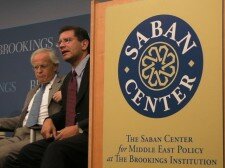Provoking a Path to Persia
Posted on 20. Oct, 2011 by Maidhc O Cathail in Opinion
The Saban Center’s prescient paper on war with Iran
Maidhc Ó Cathail
In June 2009, the Saban Center for Middle East Policy published “Which Path to Persia?—Options for a New American Strategy toward Iran.” Writing in a tone strikingly reminiscent of the Project for a New American Century’s infamous pre-9/11 paper “Rebuilding America’s Defenses,” the six co-authors noted that, “It seems highly unlikely that the United States would mount an invasion without any provocation or other buildup.” For a think tank specifically established by media mogul Haim Saban to protect Israel, this could prove to be a formidable obstacle impeding their desired march—of U.S. troops—to Tehran.
“In fact, if the United States were to decide that to garner greater international support, galvanize U.S. domestic support, and/or provide a legal justification for an invasion, it would be best to wait for an Iranian provocation, then the time frame for an invasion might stretch out indefinitely,” Saban’s think-tankers ruefully observed.
“With only one real exception, since the 1978 revolution, the Islamic Republic has never willingly provoked an American military response, although it certainly has taken actions that could have done so if Washington had been looking for a fight. Thus it is not impossible that Tehran might take some action that would justify an American invasion. And it is certainly the case that if Washington sought such a provocation, it could take actions that might make it more likely that Tehran would do so (although being too obvious about this could nullify the provocation). However, since it would be up to Iran to make the provocative move, which Iran has been wary of doing most times in the past, the United States would never know for sure when it would get the requisite Iranian provocation. In fact, it might never come at all.”
Seemingly undeterred by Iran’s frustrating unwillingness to provide the requisite provocation, the analysts continued to examine this option:
“As noted above, in the section on the time frame for an invasion, whether the United States decides to invade Iran with or without a provocation is a critical consideration. With provocation, the international diplomatic and domestic political requirements of an invasion would be mitigated, and the more outrageous the Iranian provocation (and the less that the United States is seen to be goading Iran), the more these challenges would be diminished. In the absence of a sufficiently horrific provocation, meeting these requirements would be daunting.”
Ruling out the likelihood of “an overt, incontrovertible, and unforgivable act of aggression—something on the order of an Iranian-backed 9/11 … given Iran’s history of avoiding such acts,” the authors went on to explore where “the question of provocation gets murky.”
“Most European, Asian, and Middle Eastern publics are dead set against any American military action against Iran derived from the current differences between Iran and the international community—let alone Iran and the United States,” they wistfully noted. “Other than a Tehran-sponsored 9/11, it is hard to imagine what would change their minds.”
Even Iran’s long-time Sunni rival in the region appeared recalcitrant to the idea. “Saudi Arabia is positively apoplectic about the Iranians’ nuclear program, as well as about their mischief making in Lebanon, Iraq, and the Palestinian territories,” the pro-Israeli analysts empathised. “Yet, so far, Riyadh has made clear that it will not support military operations of any kind against Iran. Certainly that could change, but it is hard to imagine what it would take.”
Would a dastardly plot to blow up King Abdullah’s “hand-picked, trusted envoy” in a D.C. restaurant suffice, perchance?
At least, the lead author of “Which Path to Persia?” seems to think so. On October 11, Kenneth Pollack opined on “Iran’s Covert War Against the United States”: “It’s shocking, but not entirely surprising to learn that the United States government has evidence that the Iranian regime was trying to kill Saudi Ambassador to the United States Adel al-Jubeir.”
Posing as a responsible sceptic regarding the ludicrous plot, Pollack concluded that the ultra-cautious regime he analysed for the Saban Center two years previously—relevant information not provided to the reader—may have changed for the worse: “But, if this incredible claim is proven true, it should remind us that Iran also is not a normal country by any stretch of the imagination, and that in a Middle East already in turmoil we now face a more aggressive, more risk-taking Iran that may be looking to stir the pot in ways that it once found imprudent.”
As Stephen M. Walt remarked about an earlier Tehran-baiting paper by the Saban Center director, “It is hard to read this piece without hearkening back to Pollack’s The Threatening Storm, the book that convinced many liberals to support the invasion of Iraq in 2003. What made that book especially persuasive was Pollack’s depiction of himself as a former dove who had oh-so-reluctantly concluded that there was no option but to go to war.”
Interestingly, The Daily Beast/Newsweek which published Pollack’s op-ed is partly owned by Jane Harman, whose service in Congress reportedly included a quid pro quo with an Israeli agent, involving political donations from billionaire Haim Saban, to lobby the Department of Justice to reduce espionage charges against two officials at the American Israel Public Affairs Committee. Pollack, a former member of the National Security Council, was mentioned in the indictment against Steve Rosen and Keith Weissman as one of the government officials who provided information to the two former AIPAC employees about—you guessed it—Iran.
When asked “who would want to create the impression” that the United States needs to engage in military activity against Iran, former CIA operative Michael Scheuer replied, “If I was looking at a counterintelligence operation to decide where this information came from, I’d be very interested to see if I could find an Israeli hand or a Saudi hand.”
Thanks to Kenneth Pollack, that search can now be narrowed.
loading...





